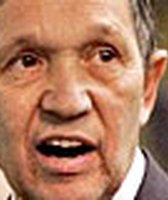Get PolitiFact in your inbox.
SUMMARY: Rudy Giuliani trotted out a common, and in this case not inaccurate, Republican refrain when he said Democrats want to raise taxes, but he mishandled the evidence.
At a July 30, 2007 campaign event in New Hampshire, Giuliani said this: "Democrats are kind of falling over each other seeing who can raise taxes faster. It looks like they're going to raise taxes anywhere between 20 to 30 percent."
So, is Giuliani, who's made tax cuts a focal point of his campaign, correct?
Before we answer that, let's dispense with the underlying assumption of Giuliani's charge, namely that letting a tax cut expire is the same thing as a tax increase. It's a bit of a philosophical question that we're not going to get to the bottom of here. Instead, we'll look at the facts.
The tax cuts pushed through during President Bush's first term were slated to expire at the end of 2010. The tax cuts, which included lowering income tax rates, were set up by Congress to expire so they wouldn't create larger deficits in the future.
The leading Republican candidates, including Giuliani, have come out in favor of making all the tax cuts permanent. With the Democrats, the picture is a bit less clear.
The Democratic candidates Giuliani referred to by name — Sens. Hillary Rodham Clinton and Barack Obama, and John Edwards — have each indicated they also favor extending Bush's tax cuts for lower- and middle-income households.
But for the wealthiest Americans (the roughly 3 percent of households earning $200,000 or more), there is general agreement among the Democratic candidates to allow the current tax cuts to expire. Tax rates would then roll back to higher, pre-2001 levels.
So for the wealthiest households, taxes would go up. But how much? Well, in terms of rates, they would rise between 9 and 13 percent, depending on income levels.
The Giuliani campaign says the "20 to 30 percent" he referred to comes from a budget estimate done by the Congressional Budget Office, which said revenues would rise up to 31.6 percent between 2006 and 2011 if the Bush tax cuts were allowed to expire.
The problem for Giuliani is two-fold.
First, the CBO estimate looked at the impact of letting all of the tax cuts expire, which is not a position widely advocated by the Democrats. Even Democrats in Congress approved a budget resolution -- which won votes from all the Senate Democrats now running for president -- that allowed for renewing some of the tax cuts.
The second issue is a matter of how to interpret that 31.6 percent increase in federal revenue.
Richard Kogan, a senior fellow at the Center on Budget and Policy Priorities, admittedly a left-leaning think tank, says it is flawed thinking to equate a rise in revenue directly with a tax increase.
"According to (Bush's) own budget that he issued in February, the (2011) revenues would increase 29 percent over 2006," Kogan said. "Does that mean Bush is planning a 29 percent tax increase? Revenues always grow from year to year unless there is a recession."
Kogan's right. Look at a table from Bush's 2008 budget and it shows that tax receipts rise between 2006 and 2011 a total of 28.95 percent.
For Kogan, there is a good example of a Democratic tax increase: John Edwards' proposal to raise the tax rate on capital gains to 28 percent (an 87 percent increase from the current rate of 15 percent) for people making more than $250,000 a year.
"It would be a tax increase," Kogan said of Edwards' plan "because it's a change in tax law." Likewise, Democrats have come out in favor of changing tax law that currently allows Wall Street hedge fund managers to claim millions of dollars in compensation as capital gains, rather than income. As a result, they pay taxes at the 15 percent capital gains rate, rather than at the top-bracket rate for income of 35 percent.
Whether or not tax laws change, it's fair for Giuliani to lay out where he differs with his opponents on taxation. But a 31 percent increase in revenue is not the same as a 31 percent hike in taxes.
Current Democratic proposals would likely increase taxes for some Americans, particularly those earning over $200,000 a year. But the amount of the increase would depend on the specific tax in question, not to mention the rung of the economic ladder where one stands.
Our Sources
Selected Provisions of Major Tax Legislation from 1981 to 2006
An Analysis of the President's Budgetary Proposals for Fiscal Year 2008
Revenue projections in President Bush's budget
Los Angeles Times, "Edwards announces 'tax the rich' plan," July 27, 2007
New York Times, "2008 Democratic Hopefuls Propose a Ceiling on the President's Tax Cuts," April 21, 2007
St. Petersburg Times interview with Richard Kogan, a senior fellow at the Center for Budget and Policy Priorities.

























